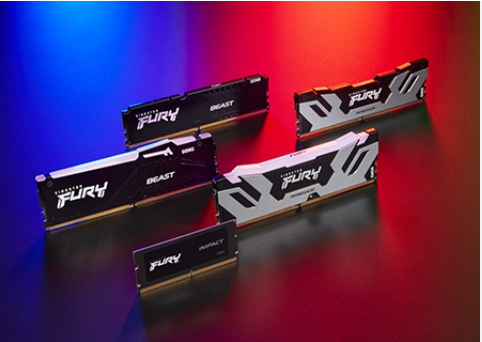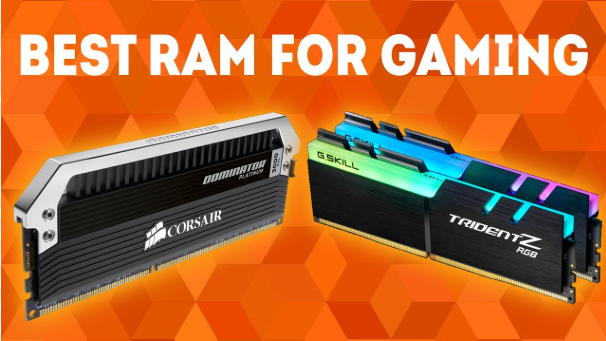When building or upgrading a gaming PC, RAM (Random Access Memory) plays a critical role in ensuring smooth gameplay, fast load times, and overall system performance. The best RAM for gaming PCs combines speed, capacity, and latency to match your processor and GPU, delivering an optimized gaming experience.
In this article, we’ll walk you through the step-by-step criteria to choose the best RAM for gaming, followed by top-rated recommendations.
Table of Contents
ToggleBest RAM for Gaming PC: A Step-by-Step:-
🔹 Step 1: Understand RAM Basics
Before making a purchase, it’s important to understand the key specifications of RAM:
✅ Key Specs:
- Type: Most gaming PCs today use DDR4 or DDR5
- Capacity: 16 GB is standard for modern games; 32 GB is ideal for multitasking or streaming
- Speed (Frequency): Measured in MHz (e.g., 3200MHz, 6000MHz) — higher is better
- Latency (CL): Lower CAS Latency = faster response time (e.g., CL16 is better than CL18)
🔹 Step 2: Choose Between DDR4 vs DDR5
✅ DDR4:
- Mature, affordable, and widely supported
- Speeds range from 2133MHz to 3600MHz+
- Best for Intel 10th/11th Gen and AMD Ryzen 3000/5000
✅ DDR5:
- Faster speeds (starting at 4800MHz, up to 8000MHz+)
- Higher bandwidth and efficiency
- Ideal for Intel 12th/13th/14th Gen and AMD Ryzen 7000 series
- More expensive, but future-proof
🔍 Tip: Ensure your motherboard supports DDR5 before buying.
🔹 Step 3: Determine the Right RAM Capacity
Gaming today demands more RAM than ever before.
🎮 Minimum Requirements:
| Game Type | Recommended RAM |
| Casual/Indie Titles | 8 GB |
| Modern AAA Games | 16 GB |
| Streaming + Gaming | 32 GB |
| Content Creation + Games | 32–64 GB |
🔹 Step 4: Choose Dual or Quad Channel

Dual-channel memory boosts performance by doubling memory bandwidth when you install RAM sticks in matched pairs (e.g., 2×8 GB, 2×16 GB).
✅ Recommendations:
- Always buy RAM in matched kits for best stability
- Use identical sticks (same brand, speed, and capacity)
- Install in the correct slots as indicated by your motherboard manual
🔹 Step 5: Prioritize Speed and Latency
For gaming, higher speed and lower latency improve frame rates and responsiveness—especially in CPU-heavy games.
🔧 Examples:
- DDR4 3200MHz CL16 is a great balance for Ryzen/Intel builds
- DDR5 6000MHz CL36 is ideal for next-gen Intel and AMD platforms
⚠️ Speeds above motherboard/CPU support will downclock automatically.
🔹 Step 6: Look for Heat Spreaders and Aesthetics
Performance RAM often comes with aluminum heat spreaders for thermal management, which is important in overclocked systems.
✅ Optional Features:
- RGB lighting (Corsair Vengeance RGB, G.Skill Trident Z RGB)
- Low-profile design (important for air-cooled CPUs)
🔹 Step 7: Check Compatibility
Before buying RAM, ensure it’s compatible with your:
- Motherboard chipset and RAM slots
- CPU memory controller support
- Clearance with CPU cooler or GPU
Use the QVL (Qualified Vendor List) on your motherboard’s website to check for tested RAM kits.
Read also:-Bluetooth Not Working on iPhone? 7 Easy Fixes That Actually Work
🔹 Top 5 Best RAM for Gaming PC in 2025
1. Corsair Vengeance DDR5 6000MHz CL36 (2x16GB)
- Great for Intel 13th/14th Gen and AMD AM5 builds
- Excellent performance with XMP 3.0 support
2. G.Skill Trident Z5 RGB DDR5 6400MHz CL32
- Premium RAM with top-tier speed and RGB
- Ideal for enthusiast gamers and streamers
3. Kingston FURY Beast DDR4 3200MHz CL16 (2x8GB)
- Reliable and affordable for mid-range builds
- Great for Ryzen 5000 and Intel 10/11th Gen
4. TEAMGROUP T-Force Delta RGB DDR5 5600MHz
- Good balance of speed, aesthetics, and price
- Recommended for gaming and multitasking
5. Crucial Ballistix DDR4 3600MHz CL16 (2x16GB)
- Solid performance at a reasonable price
- Excellent for high-refresh rate gaming
✅ Conclusion
The best RAM for gaming PC depends on your platform, budget, and performance goals. While 16 GB of DDR4 at 3200MHz is still great for most gamers, those with next-gen builds should look to DDR5 with 6000MHz+ speeds for future-proof performance.
Always pair your RAM selection with a compatible motherboard, prioritize dual-channel kits, and check latency and heat management for optimal results.







